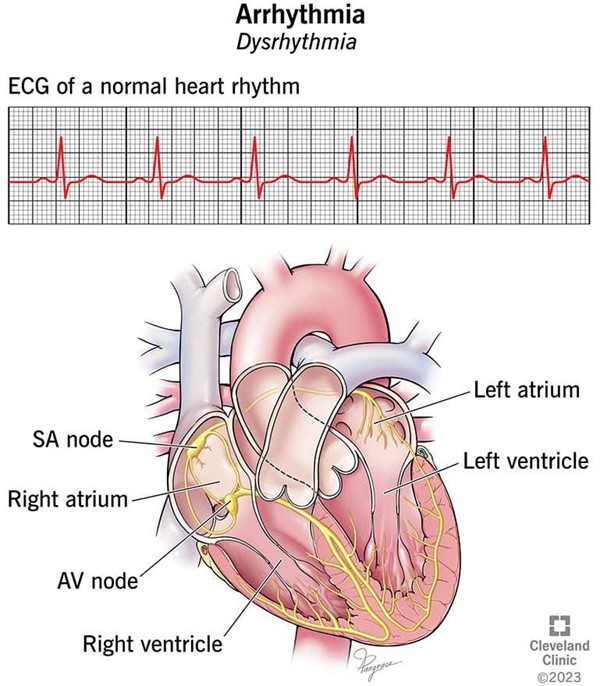A nurse is caring for a client at a follow-up visit who has been taking lithium therapy for bipolar disorder.
Which of the following findings should indicate to the nurse that the client is experiencing lithium toxicity?
Hypoglycemia.
Excess salivation.
Urinary retention.
Dysrhythmia.
The Correct Answer is D
Dysrhythmia is an abnormal heart rhythm that can be a sign of severe lithium toxicity.

Lithium toxicity can occur when a person takes too much lithium, a mood- stabilizing medication used to treat bipolar disorder and major depressive disorder.
Choice A is wrong because hypoglycemia is not a symptom of lithium toxicity. Hypoglycemia is low blood sugar that can cause symptoms such as shakiness, sweating, hunger, and confusion.
Choice B is wrong because excess salivation is not a symptom of lithium toxicity. Excess salivation can be caused by various factors, such as infections, medications, or nerve damage.
Choice C is wrong because urinary retention is not a symptom of lithium toxicity. Urinary retention is the inability to empty the bladder completely, which can cause pain, discomfort, and infection. Lithium toxicity can actually cause increased urine output, not decreased.
Normal ranges for blood lithium levels are 0.6 to 1.2 mEq/L for maintenance therapy and 0.8 to 1.5 mEq/L for acute therapy. Levels above 1.5 mEq/L can cause mild to moderate toxicity, and levels above 2.0 mEq/L can cause severe toxicity. Levels above 3.0 mEq/L are considered a medical emergency.
Nursing Test Bank
Naxlex Comprehensive Predictor Exams
Related Questions
Correct Answer is B
Explanation
Observe the client’s body language during the conversation. This action will help the nurse to assess the client’s nonverbal cues and emotions, which can enhance communication and understanding. The nurse should also determine the client’s understanding several times during the conversation and use lay terms if possible.
Choice A is wrong because avoiding asking the client personal questions can hinder rapport building and prevent the nurse from obtaining important information about the client’s health and needs.
Choice C is wrong because maintaining eye contact with the interpreter when asking questions can show disrespect and disinterest to the client and his family. The nurse should look at the client and his family when asking questions, not at the interpreter.
Choice D is wrong because including medical terminology when discussing the client’s condition can confuse the client and his family and create barriers to communication. The nurse should use simple and clear language that the client and his family can understand.
Correct Answer is C
Explanation
The HbA1c value determines long-term blood glucose control for the past 120 days. This is because the HbA1c test measures what percentage of hemoglobin proteins in your blood are coated with sugar (glycated). Hemoglobin proteins in red blood cells live for around 120 days, so the test reflects your average blood sugar level for the past two to three months.
Choice A is wrong because an HbA1c value greater than 8% indicates poor diabetic control of blood sugar. The HbA1c target for most people with type 1 diabetes is 48 mmol/mol (or 6.5%) or lower.
Choice B is wrong because the HbA1c value is not altered by eating habits the day before the test. The test does not require fasting and can be done at any time of the day.
Choice D is wrong because an HbA1c test should be performed more than once per year.
The frequency of the test depends on the type of diabetes, your treatment plan and your blood sugar level. For example, you may need the test twice a year if you have good blood sugar control, or four times a year if you take insulin or have trouble keeping your blood sugar level within your target range.
Whether you are a student looking to ace your exams or a practicing nurse seeking to enhance your expertise , our nursing education contents will empower you with the confidence and competence to make a difference in the lives of patients and become a respected leader in the healthcare field.
Visit Naxlex, invest in your future and unlock endless possibilities with our unparalleled nursing education contents today
Report Wrong Answer on the Current Question
Do you disagree with the answer? If yes, what is your expected answer? Explain.
Kindly be descriptive with the issue you are facing.
